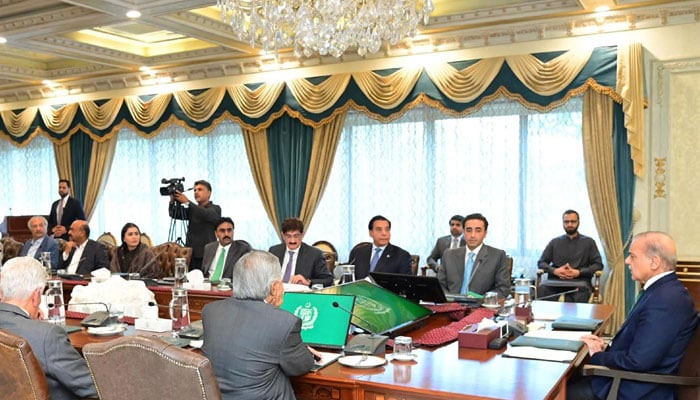CCI decision
Pakistan’s political and ecological stability depends on policies that are inclusive, scientifically sound and democratically endorsed
Monday finally saw some sense prevail with the Council of Common Interests (CCI) delivering a long-overdue but crucial verdict: the federal government’s proposal for the construction of new canals – including the contentious Cholistan project – stands rejected. By overturning the Executive Committee of the National Economic Council’s (ECNEC) February approval, the CCI has restored a key principle of federal governance: that natural resources, especially water, must be managed through consensus, not fiat. For the past many weeks, there have been protests – which still continue – over the plan to build six canals off the Indus River to irrigate the Cholistan desert. Sindh, as the lower riparian province, saw this as an existential threat. For weeks, the protests, sit-ins and road blockades going on in Sindh have been highlighting the intensity of public sentiment and the political cost of unilateral decision-making. The resulting suspension of inter-provincial transport severely disrupted the supply of essentials like petrol and food, leaving trucks stranded and economies in distress.
What should have been a straightforward matter of consultation spiralled into a political crisis, with the PPP threatening to exit the coalition government. President Asif Ali Zardari’s sharp rebuke of the project in his address to parliament back in March should have signalled how seriously Sindh viewed the matter. Yet, the centre let the issue fester, a costly misstep that could have seriously impacted an already fragile political arrangement. It wasn’t until the joint press conference between Prime Minister Shehbaz Sharif and PPP Chairman Bilawal Bhutto-Zardari that the government finally committed to course correction. By then, though, the damage was already visible: politically, economically and socially. But let’s also reiterate that this is not just about politics. Water in Pakistan is a sensitive, even volatile, issue – something that has been driven home even more recently. We have rightly condemned India’s threats to suspend the Indus Waters Treaty as hostile and provocative. And within our own borders, the allocation of water is no less delicate. For provinces like Sindh, the equitable distribution of Indus waters is a lifeline, not a luxury. Any attempt to divert water, especially without consultation, not only undermines trust but can unravel the very fabric of national unity.
Environmental sustainability is another critical dimension. Pakistan is one of the most water-stressed countries in the world. Large-scale canal projects, if not grounded in hydrological reality and ecological balance, risk exacerbating already severe water shortages downstream, disrupting river ecosystems and accelerating desertification. The rush to ‘green’ deserts cannot come at the cost of depriving fertile lands of their due share of water. Infrastructure must serve the long-term interests of all, not just the immediate goals of one region or political interest. The federal government must take this episode as a wake-up call. Infrastructure planning – especially on water – cannot be divorced from inter-provincial cooperation, environmental assessments or economic consequences. Pakistan’s political and ecological stability depends on building policies that are inclusive, scientifically sound and democratically endorsed. Consensus has to be seen as a necessity, not just a procedural nicety.
-
 Hilary Duff’s Son Roasts Her Outfit In New Album Interview
Hilary Duff’s Son Roasts Her Outfit In New Album Interview -
 Alexandra Daddario, Andrew Form Part Ways After 3 Years Of Marriage
Alexandra Daddario, Andrew Form Part Ways After 3 Years Of Marriage -
 Eric Dane Rejected Sex Symbol Label
Eric Dane Rejected Sex Symbol Label -
 Avan Jogia Says Life With Fiancee Halsey Feels Like 'coming Home'
Avan Jogia Says Life With Fiancee Halsey Feels Like 'coming Home' -
 Kate Middleton's Role In Handling Prince William And Harry Feud Revealed
Kate Middleton's Role In Handling Prince William And Harry Feud Revealed -
 Tucker Carlson Says Passport Seized, Staff Member Questioned At Israel Airport
Tucker Carlson Says Passport Seized, Staff Member Questioned At Israel Airport -
 David, Victoria Beckham Gushes Over 'fiercely Loyal' Son Cruz On Special Day
David, Victoria Beckham Gushes Over 'fiercely Loyal' Son Cruz On Special Day -
 Taylor Swift Made Sure Jodie Turner-Smith's Little Girl Had A Special Day On 'Opalite' Music Video Set
Taylor Swift Made Sure Jodie Turner-Smith's Little Girl Had A Special Day On 'Opalite' Music Video Set -
 Eric Dane Says Touching Goodbye To Daughters Billie And Georgia In New Netflix Documentary
Eric Dane Says Touching Goodbye To Daughters Billie And Georgia In New Netflix Documentary -
 Channing Tatum Reveals What He Told Daughter After Violent Incident At School
Channing Tatum Reveals What He Told Daughter After Violent Incident At School -
 King Charles Lands In The Line Of Fire Because Of Andrew Mountbatten-Windsor
King Charles Lands In The Line Of Fire Because Of Andrew Mountbatten-Windsor -
 Denise Richards Doubles Down On Abuse Claims Against Ex Husband Aaron Phypers Amid Show Return
Denise Richards Doubles Down On Abuse Claims Against Ex Husband Aaron Phypers Amid Show Return -
 Russia Set To Block Overseas Crypto Exchanges In Sweeping Crackdown
Russia Set To Block Overseas Crypto Exchanges In Sweeping Crackdown -
 Gwyneth Paltrow Reveals Deep Personal Connection With Kate Hudson
Gwyneth Paltrow Reveals Deep Personal Connection With Kate Hudson -
 Prince Harry, Meghan Markle’s Game Plan For Beatrice, Eugenie: ‘Extra Popcorn For This Disaster’
Prince Harry, Meghan Markle’s Game Plan For Beatrice, Eugenie: ‘Extra Popcorn For This Disaster’ -
 OpenAI To Rollout AI Powered Smart Speakers By 2027
OpenAI To Rollout AI Powered Smart Speakers By 2027




